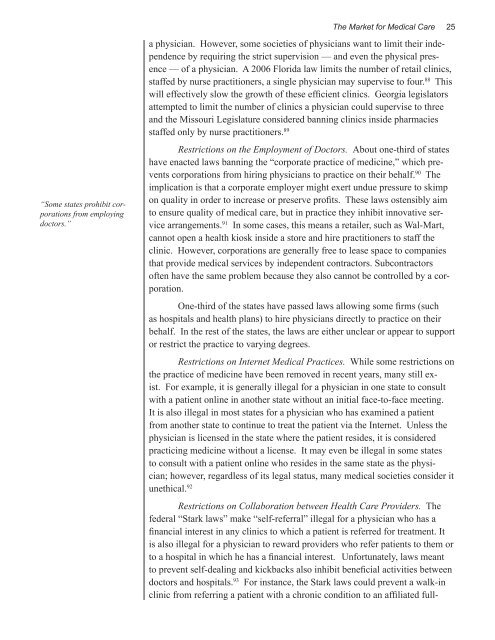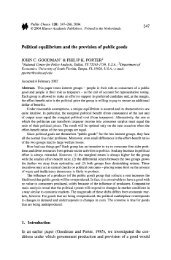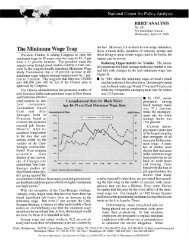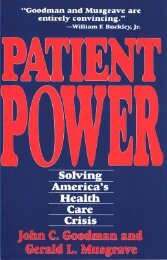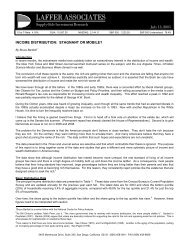The Market for Medical Care: Why You Don't Know the Price; Why ...
The Market for Medical Care: Why You Don't Know the Price; Why ...
The Market for Medical Care: Why You Don't Know the Price; Why ...
- No tags were found...
Create successful ePaper yourself
Turn your PDF publications into a flip-book with our unique Google optimized e-Paper software.
<strong>The</strong> <strong>Market</strong> <strong>for</strong> <strong>Medical</strong> <strong>Care</strong> 25“Some states prohibit corporationsfrom employingdoctors.”a physician. However, some societies of physicians want to limit <strong>the</strong>ir independenceby requiring <strong>the</strong> strict supervision — and even <strong>the</strong> physical presence— of a physician. A 2006 Florida law limits <strong>the</strong> number of retail clinics,staffed by nurse practitioners, a single physician may supervise to four. 88 Thiswill effectively slow <strong>the</strong> growth of <strong>the</strong>se efficient clinics. Georgia legislatorsattempted to limit <strong>the</strong> number of clinics a physician could supervise to threeand <strong>the</strong> Missouri Legislature considered banning clinics inside pharmaciesstaffed only by nurse practitioners. 89Restrictions on <strong>the</strong> Employment of Doctors. About one-third of stateshave enacted laws banning <strong>the</strong> “corporate practice of medicine,” which preventscorporations from hiring physicians to practice on <strong>the</strong>ir behalf. 90 <strong>The</strong>implication is that a corporate employer might exert undue pressure to skimpon quality in order to increase or preserve profits. <strong>The</strong>se laws ostensibly aimto ensure quality of medical care, but in practice <strong>the</strong>y inhibit innovative servicearrangements. 91 In some cases, this means a retailer, such as Wal-Mart,cannot open a health kiosk inside a store and hire practitioners to staff <strong>the</strong>clinic. However, corporations are generally free to lease space to companiesthat provide medical services by independent contractors. Subcontractorsoften have <strong>the</strong> same problem because <strong>the</strong>y also cannot be controlled by a corporation.One-third of <strong>the</strong> states have passed laws allowing some firms (suchas hospitals and health plans) to hire physicians directly to practice on <strong>the</strong>irbehalf. In <strong>the</strong> rest of <strong>the</strong> states, <strong>the</strong> laws are ei<strong>the</strong>r unclear or appear to supportor restrict <strong>the</strong> practice to varying degrees.Restrictions on Internet <strong>Medical</strong> Practices. While some restrictions on<strong>the</strong> practice of medicine have been removed in recent years, many still exist.For example, it is generally illegal <strong>for</strong> a physician in one state to consultwith a patient online in ano<strong>the</strong>r state without an initial face-to-face meeting.It is also illegal in most states <strong>for</strong> a physician who has examined a patientfrom ano<strong>the</strong>r state to continue to treat <strong>the</strong> patient via <strong>the</strong> Internet. Unless <strong>the</strong>physician is licensed in <strong>the</strong> state where <strong>the</strong> patient resides, it is consideredpracticing medicine without a license. It may even be illegal in some statesto consult with a patient online who resides in <strong>the</strong> same state as <strong>the</strong> physician;however, regardless of its legal status, many medical societies consider itunethical. 92Restrictions on Collaboration between Health <strong>Care</strong> Providers. <strong>The</strong>federal “Stark laws” make “self-referral” illegal <strong>for</strong> a physician who has afinancial interest in any clinics to which a patient is referred <strong>for</strong> treatment. Itis also illegal <strong>for</strong> a physician to reward providers who refer patients to <strong>the</strong>m orto a hospital in which he has a financial interest. Un<strong>for</strong>tunately, laws meantto prevent self-dealing and kickbacks also inhibit beneficial activities betweendoctors and hospitals. 93 For instance, <strong>the</strong> Stark laws could prevent a walk-inclinic from referring a patient with a chronic condition to an affiliated full-


